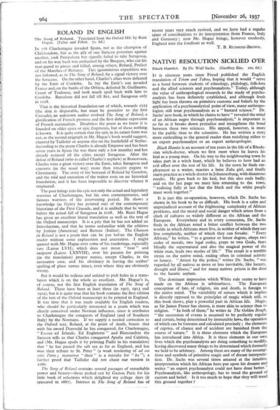NATIVE RESOLUTION SICKLIED O'ER
Black Hamlet. By Dr. Wulf Sachs. (Geoffrey Bles. to& 6d.) Ir is nineteen years since Freud published the English translation of Totem and Taboo, hoping that it would " serve as a bond between students of ethnology, philology, folk-lore and the allied sciences and psychoanalysts." Today, although the value of anthropological research to the study of psycho- analysis has been definitely established, and although fresh light has been thrown on primitive customs and beliefs by the application of a psychoanalytical point of view, many anthropo- logists still treat psychoanalysis as a " bastard science." Dr. Sachs' new book, in which he claims to have " revealed the mind of an African negro through psychoanalysis," is important in so far as it breaks down prejudice and strengthens the bond between these two sciences. His appeal, however, is more to the public than to the scientists. He has written a story more enthralling to the general reader than satisfying either to an expert psychoanalyst or an expert anthropologist.
Black Hamlet is an account of ten years in the life of a Rhode- sian witch-doctor, whom we first meet when he leaves his kral as a young man. On his way to the neighbouring town he takes part in a witch hunt, which he believes to have had an evil effect over the rest of his life. In the town he finds em- ployment as a waiter, marries a lame Zulu girl, and finally starts practice as a witch-doctor in Johannesburg, with disastrous results. He goes back to his kral, but this also ends badly, and on the last page we meet him returning to the town, " realising fully at last that the black and the white people must work together."
It is just this co-operation, however, which Dr. Sachs has shown in his book to be so difficult. His book is a calm and unprejudiced account of the frightening complexity of African problems, and the moral and social danger which arises from a clash of cultures so widely different as the African and the European. Everywhere and in every connexion, Dr. Sachs finds in the African mind a bitter conflict between the two worlds in which Africans must live, in neither of which they can live completely, neither of which they can forsake. " Every African," he writes, " to a greater or lesser degree, obeys two codes of morals, two legal codes, prays to two Gods, fears blindly the supernatural and also the magical power of the white man, leads two modes of life." The result is a terrible strain on the native mind, ending often in criminal activity or lunacy. " Arrest by the police," writes Dr. Sachs, " was regarded by all natives as more or less inevitable, like locusts, drought and illness," and for many natives prison is the door to the lunatic asylum.
The dominant impression which White rule seems to have made on the African is arbitrariness. The European conception of fate, of religion, sin and death, is foreign to the native mind. The variability of nature which it implies is directly opposed to the principles of magic which still, as this book shows, play a powerful part in African life. Magic, as Sir James Frazer has shown, is more akin to science than to religion. " In both of them," he writes in The Golden Bough, " the succession of events is assumed to be perfectly regular and certain, being determined by immutable laws, the operation of which can be foreseen and calculated precisely ; the elements of caprice, of chance and of accident are banished from the course of nature." It is these elements which the European has introduced into Africa. It is these elements in our own lives which the psychoanalysts are doing something to modify, having discovered many things to be determined which formerly we held to be arbitrary. Among these are many of the assump- tions and symbols of primitive magic and of dream interpreta- tion. Dr. Sachs was several times amazed at the intuitive interpretation which his African hero put upon his dreams and writes " an expert psychoanalyst could not have done better." Psychoanalysis, like anthropology, has to tread the ground of custom and belief.: Is it too much to hope that they will tread this ground together ?














































 Previous page
Previous page